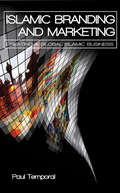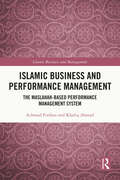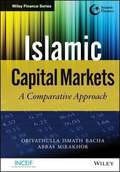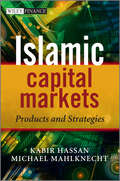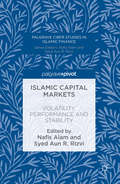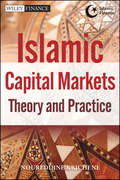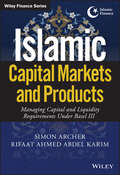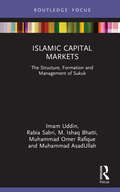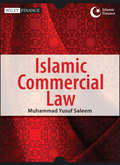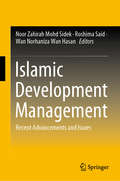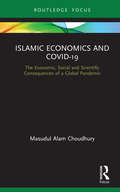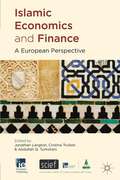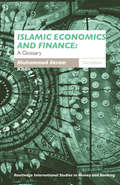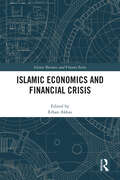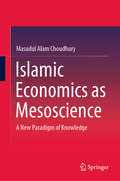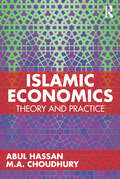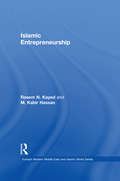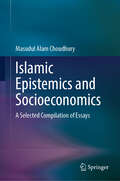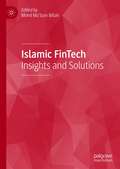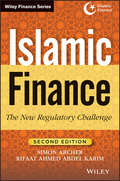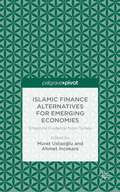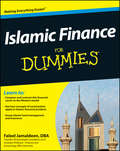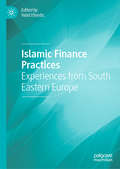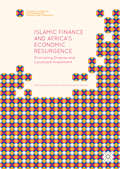- Table View
- List View
Islamic Banks and Financial Institutions: A Study Of Their Objectives And Achievements (Palgrave Macmillan Studies in Banking and Financial Institutions)
by Fayaz LoneThis book is a study of the objectives of Islamic Finance in the modern banking space and offers insight into the effects of changes and developments occurring in Islamic banking products and services.
Islamic Branding and Marketing
by Paul TemporalIslamic Branding and Marketing: Creating A Global Islamic Business provides a complete guide to building brands in the largest consumer market in the world. The global Muslim market is now approximately 23 percent of the world's population, and is projected to grow by about 35 percent in the next 20 years. If current trends continue, there are expected to be 2. 2 billion Muslims in 2030 that will make up 26. 4 percent of the world's total projected population of 8. 3 billion. As companies currently compete for the markets of China and India, few have realized the global Muslim market represents potentially larger opportunities. Author Paul Temporal explains how to develop and manage brands and businesses for the fast-growing Muslim market through sophisticated strategies that will ensure sustainable value, and addresses issues such as: How is the global Muslim market structured? What opportunities are there in Islamic brand categories, including the digital world? What strategies should non-Muslim companies adopt in Muslim countries? More than 30 case studies illustrate practical applications of the topics covered, including Brunei Halal Brand, Godiva Chocolatier, Johor Corporations, Nestle, Unilever, Fulla, Muxlim Inc, and more. Whether you are in control of an established company, starting up a new one, or have responsibility for a brand within an Islamic country looking for growth, Islamic Branding and Marketing is an indispensable resource that will help build, improve and secure brand equity and value for your company.
Islamic Business and Performance Management: The Maslahah-Based Performance Management System (Islamic Business and Management)
by Khaliq Ahmad Achmad FirdausThis unique book discovers a new dimension in the study of strategic and performance management in Islamic Business studies. It addresses the missing link of spirituality from modern-day organizational structure in the presence of high-tech pressure in all areas of human endeavours. The authors propose an integrated study of Islamic business approach to strategic and performance management systems to achieve sustainable organizational performance. The book explores employees’ wellbeing and organizations’ perceiving work environment as a spiritual pathway to cultivate values in Islamic business ecosystem to sustain humanity. It is all about care, empathy, and sustenance of others, about truthfulness and management being truthful to themselves and others and endeavouring to live their values more effusively while performing their work. The book stresses the impact of spirituality in performance management, concluding that for any organization to run efficiently, spirituality is the core component to attain happiness, contentment, and success. The book will be of interest to a variety of management scholars, including those researching and studying performance management, talent management, strategic management, and business ethics.
Islamic Capital Markets
by Abbas Mirakhor Obiyathulla Ismath BachaA comprehensive examination of Islamic capital marketsTaking a comparative approach to the subject, this text looks at the similarities and differences between Islamic capital markets and conventional capital markets. The book explains each particular topic from both the conventional and the Islamic perspective, offering a full understanding of Islamic capital markets, processes, and instruments. In addition to a full explanation of Islamic products, this approach also ensures a holistic understanding of the dual markets within which Islamic capital markets operate.Ideal for both students and current practitioners, The New Islamic Capital Markets fills a large gap in the current literature on the subject. Whereas most books in this field cover the topic only superficially, this book offers the depth of coverage and academic rigor needed by professionals and serious students.Fills a gap in the current literature on the subject with comprehensive coverage and in-depth explanationsTakes a comparative and holistic approach to the subject and features case studies from Malaysia, Indonesia, the Middle East, and EuropeWritten by a professor of finance at the International Centre for Education in Islamic Finance (INCEIF)One of the few comprehensive, dedicated guides to the subject available, The New Islamic Capital Markets offers a full understanding of the subject for students and professionals alike.
Islamic Capital Markets
by Kabir Hassan Michael MahlknechtIslamic Finance has experienced rapid growth in recent years, showing significant innovation and sophistication, and producing a broad range of investment products which are not limited to the complete replication of conventional fixed-income instruments, derivatives and fund structures. Islamic Finance represents an elemental departure from traditional interest-based and speculative practices, relying instead on real economic transactions, such as trade, investment based on profit sharing, and other solidary ways of doing business, and aims to incorporate Islamic principles, such as social justice, ecology and kindness, to create investment products and financial markets which are both ethical and sustainable.Products created according to Islamic principles have shown a low correlation to other market segments and are relatively independent even from market turbulences like the subprime crisis. Therefore, they have become increasingly popular with secular Muslims and non-Muslim investors, as highly useful alternative investments for the diversification of portfolios.In Islamic Capital Markets: Products and Strategies, international experts on Islamic Finance and Sharia'a Law focus on the most imminent issues surrounding the evolution of Islamic capital markets and the development of Sharia'a-compliant products. The book is separated into four parts, covering:General concepts and legal issues, including Rahn concepts in Saudi Arabia, the Sharia'a process in product development and the integration of social responsibility in financial communities;Global Islamic capital market trends, such as the evolution of Takaful products and the past, present and future of Islamic derivatives;National and regional experiences, from the world's largest Islamic financial market, Malaysia, to Islamic finance in other countries, including Germany, France and the US;Learning from Islamic finance after the global financial crisis; analysis of the risks and strengths of Islamic capital markets compared to the conventional system, financial engineering from an Islamic perspective, Sharia'a-compliant equity investments and Islamic microfinance.Islamic Capital Markets: Products and Strategies is the complete investors' guide to Islamic finance.
Islamic Capital Markets
by Nafis Alam Syed Aun R. RizviThis book addresses contemporary empirical issues in Islamic stock markets including volatility, efficiency and Sukuk defaults. The studies contained within this book consider a combination of pure Islamic stock markets and comparative studies, with reference to their conventional counterparts. The authors provide up-to-date, robust, accurate, reliable empirical enquiries addressing current issues of stock markets as well as providing up to date information and statistics to support future development and research. The book also covers a chapter on the current trends in research in Islamic capital markets, which analyses some recent and leading works to highlight and indicate the gaps in research that require further exploration. This book will be of value to all those who wish to gain a more thorough understanding of research in Islamic capital markets and the major topics in the field.
Islamic Capital Markets
by Noureddine KricheneA comprehensive look at the essentials of Islamic capital markets Bringing together theoretical and practical aspects of capital markets, Islamic Capital Markets offers readers a comprehensive insight into the institutions, instruments, and regulatory framework that comprise Islamic capital markets. Also exploring ideas about money, central banking, and economic growth theory and their role in Islamic capital markets, the book provides students and practitioners with essential information about the analytical tools of Islamic capital markets, serves as a guide to investing in Islamic assets, and examines risk management and the structure of Islamic financial products. Author and Islamic finance expert Noureddine Krichene examines the development of leading Islamic capital markets, including Malaysia, looking at sukuks and stocks in detail and emphasizing valuation, duration, convexity, immunization, yield curves, forward rates, swaps, and risks. Analyzing stock markets, stock valuation, price-earnings ratio, market efficiency hypothesis, and equity premiums, the book addresses uncertainty in capital markets, portfolio diversification theory, risk-return trade-off, pricing of assets, cost of capital, derivatives and their role in hedging and speculation, the principle of arbitrage and replication, Islamic structured products, the financing of large projects, and more. Emphasizes both theoretical and practical aspects of capital markets, covering analytical concepts such as the theory of arbitrage, pricing of assets, capital market pricing model, Arrow-Debreu state prices, risk-neutral pricing, derivatives markets, hedging and risk management, and structured products Provides students and practitioners of finance with must-have information about the analytical tools employed in Islamic capital markets Examines all the most recent developments in major Islamic capital markets, including Malaysia Discussing the advantages of Islamic capital markets and the prospects for their development, Islamic Capital Markets gives readers a fundamental grounding in the subject, with an emphasis on financial theory and real world practice.
Islamic Capital Markets and Products: Managing Capital and Liquidity Requirements Under Basel III
by Simon Archer Rifaat Ahmed KarimEnsure Basel III compliance with expert analysis specific to Islamic Finance Islamic Capital Markets and Products provides a thorough examination of Islamic capital markets (ICM), with particular attention to the products that they offer and the legal and regulatory infrastructure within which they operate. Since Islamic banks act as asset managers, attention is paid to the regulatory challenges which they face in the light of Basel III, as regards both eligible capital and liquidity risk management. The authors of the chapters are professionals and practitioners, and write from experience. The editors also contributed to some of the chapters. The markets and products covered include Islamic equities, Islamic investment certificates (Sukūk) which are Shari'ah compliant alternatives to conventional bonds, and Islamic Collective Investment Schemes. The coverage of legal and regulatory issues includes an examination of the implications for ICM of securities laws and regulations and of Basel III, as well as collateralisation issues. Shari'ah compliance aspects, in terms both of the selection criteria for Islamic equities and of the 'purification' of impermissible components of income, are also examined in some detail, as are the implications of Basel III for eligible capital in general and for Shari'ah compliant capital instruments in particular. A similar analysis is also made of the implications of the Basel III requirements for liquidity risk management and high quality liquid assets (HQLA), including Shari'ah compliant HQLA. The book concludes with three case studies, two describing the ICM in Malaysia and Bahrain and a third which describes Sukūk issued as Shari'ah compliant capital instruments, followed by brief concluding remarks by the editors.
Islamic Capital Markets: The Structure, Formation and Management of Sukuk (Islamic Business and Finance Series)
by M. Ishaq Bhatti Imam Uddin Rabia Sabri Muhammad Omer Rafique Muhammad AsadUllahThis book offers a unique, in-depth, and up-to-date overview of Islamic banking and finance, capital markets, and sukuks at the grassroots level. It deals with one of the most potent and increasingly popular financial instruments. It defines and explores the differences between conventional and Sukuk bonds and also examines the integration of Sukuk in various country contexts and both Muslim and non-Muslim economies. The book consists of five core topics. First, it describes the evolution of the Islamic finance industry and capital markets; second, it discusses the basic features and instruments of Islamic banking; and third, it illustrates the current state of capital markets and Islamic finance. The book then examines the development of Sukuk in Islamic capital markets and Shariah perspectives and, finally, briefly discusses the structure of Sukuks and its development in the context of Pakistan. In a nutshell, this book provides a basic understanding of Islamic financial instruments, their implementation in different regions, and their points of differentiation from conventional modes of finance; therefore, it will be a useful addition to the literature for scholars, researchers, and students of Islamic banking and finance.
Islamic Commercial Law
by Muhammad Yusuf SaleemA concise study of the practices in Islamic commercial lawFilling a gap in the current literature, Islamic Commercial Law is the only book available that combines the theory and practice of Islamic commercial law in an English-language text. From the experts at the International Islamic University Malaysia, the book examines the source materials in the Qur'an and Hadith, and highlights the views and positions of leading schools of Islamic law, without burying the reader in juristic minutia. It combines theory with practice to address the needs of students while providing a pragmatic treatment of Islamic contracts. It provides diagrams for individual contracts to reveal the type and nature of the contractual relationships between parties and discusses all types of fundamental transactions, including sales, loans, debt transfers, partnerships, and more.Written by experts from the International Islamic University Malaysia, the leading organisation in research in Islamic financeCloses a vital gap in the English-language literature on Islamic commercial lawFeatures end-of-chapter questions to enable self-testing and provoke critical thinkingAn ideal guide for current students, researchers, and practitioners, Islamic Commercial Law offers a concise yet comprehensive coverage of the subject.
Islamic Development Management: Recent Advancements and Issues
by Noor Zahirah Mohd Sidek Roshima Said Wan Norhaniza Wan HasanThis book examines a range of current issues in Islamic development management. The first part of the book explores practical issues in governance and the application of Islamic governance in new areas such as quality management systems and the tourism industry, while the second delves into questions of sustainability. The book proposes a new Islamic sustainability and offers new perspectives on CSR in connection with waqf (Islamic endowments) and microfinance. The third part of the book addresses Islamic values and how they are applied in entrepreneurship, inheritance, consumer behavior and marketing. The fourth part examines the issues of waqf and takaful (a form of insurance in line with the Islamic laws), while the fifth discusses the fiqh (the study of Islamic legal codes) and legal framework from the perspectives of entrepreneurship, higher education, reporting and inheritance (wills). The final chapter is dedicated to the application of Islamic principles in various other issues.Written in an accessible style, the book will appeal to newcomers to the field, as well as researchers and academics with an interest in Islamic development management.
Islamic Economics and COVID-19: The Economic, Social and Scientific Consequences of a Global Pandemic (Routledge Focus on Economics and Finance)
by Masudul Alam ChoudhuryThis book is a timely exploration of an unprecedented, cataclysmic pandemic episode. It examines certain critical aspects of socio-scientific theory across a variety of diverse themes, and through an epistemic lens. The book investigates the general theory of pandemic episodes and their adverse long-term effects on human and environmental wellbeing. It includes an in-depth study of COVID-19 but also looks to the future to contemplate potential pandemics to come. The existing approach to the study of pandemics is critically examined in terms of the prevalent isolated and thus mutated way of viewing human and mechanical relations in the name of specialization and modernity. The book presents a novel model of science-economy-society moral inclusiveness that forms a distinctive theoretical approach to the issue of normalizing all forms of pandemic challenges. It is methodologically different from existing economic theory, including the critical study of microeconomic foundations of macroeconomics. Human and environmental existence along with its multidisciplinary outlook of unity of knowledge between modernity, traditionalism, and socio-cultural values is emphasized in the treatment and cure of pandemic episodes. The book is a unique reference work, offering fresh wisdom within the moral methodological worldview.
Islamic Economics and Finance
by Jonathan Langton Cristina Trullols Abdullah Q. TurkistaniIn June 2010 IE Business School, with King Abdulaziz University, gathered in Madrid some of the world's foremost scholars, academics and practitioners of Islamic Economics and Finance. These highlights of the symposium and original articles specifically address the post-crisis application of this growing and relevant economic philosophy in Europe.
Islamic Economics and Finance: A Glossary (Routledge International Studies In Money And Banking Ser. #Vol. 23)
by Tony Watson Muhammad Akram KhanIslamic economics and finance have increased in importance over the last few decades, with new Islamic financial institutions opening up and a number of important books published on the topic.This glossary, fully updated and revised for the new edition, uses easy to understand language to introduce terms used by Muslim scholars, historians and lega
Islamic Economics and Financial Crisis (Islamic Business and Finance Series)
by Akkas, Edited by ErhanThis book explores the causes of the current economic crisis, evaluates the foundational principles of capitalism that contribute to crises, and investigates how an Islamic economic and banking system could play a role in fostering global stability.It includes theoretical and empirical analysis and assesses the resilience of the Islamic economic system and Islamic financial institutions in the face of economic and financial crises, with a particular focus on Organisation of Islamic Cooperation (OIC) member countries. Furthermore, the effects of these crises on income and wealth distribution are discussed. The book compares Islamic and conventional economics in response to economic crises, both across countries and financial institutions and provides a brief analysis of financial crises from a theoretical point of view, examining various approaches. It addresses the issue of the relevance of all these theories in relation to the present crisis and draws useful policy implications. Thereafter, it discusses how the Islamic financial system could serve to mitigate the occurrence of a financial crisis, since the prohibition of riba, maysir, and gharar transactions offers a solution to financial crisis from speculative bubbles and crash. It also discusses some of the challenges facing the Islamic finance industry.This is a useful guide for researchers and advanced students of Islamic Economics and Finance.
Islamic Economics as Mesoscience: A New Paradigm of Knowledge
by Masudul Alam ChoudhuryThis book presents the building blocks of Islamic economics as meso-science, offering an in-depth study of the Qur’anic worldview of the monotheistic unity of knowledge, which is the universal and unique message of Tawhid in the Qur’an. This primal ontological premise is formalised in an analytical approach that introduces and unpacks the philosophical concepts of ontology, epistemology, and phenomenology in relation to the Tawhidi methodological worldview. The analysis of Qur’anic logical consistency is then cast in a phenomenological perspective by applying the complete model of the unity of knowledge of the Qur’an in a specific study of the Tawhidi methodological approach to Islamic financial-economic theory. In doing so, it tackles the problems of meso-economics given its socio-scientific holism in world affairs. It hones in on the results of the symbiotic modulation of evolutionary learning processes in the world system of the unity of knowledge and its material embedding across knowledge, and knowledge-induced space and time dimensions. The author poses that Shari’ah is only partial in its scope, and excludes an analytical methodological worldview. Shari’ah is thus cast in the midst of a meso-socio-scientific absence of any appertaining methodology. The book is a landmark work in the conceptual and applied understanding of Tawhid as the methodological worldview of the monotheistic unity of knowledge in the meso-socio-scientific realm of ‘everything’, particularised to Islamic economics. Adopting an inter-disciplinary view integrating various fields, it challenges pervasive Western academic and institutional thinking in terms of economics. It will be of interest to students and researchers in Islamic economics, religious theory, Islamic philosophy, development studies, and finance.
Islamic Economics: Theory and Practice
by Abul Hassan M.A. ChoudhuryThis book is a comprehensive study, which provides informed knowledge within the field of Islamic economics. The authors lay down the principal philosophical foundation of a unique and universal theory of Islamic economics by contrasting it with the perspectives of mainstream economics. The methodological part of the theory of Islamic economics arises from the ethical foundations of the Qur'an and the Sunnah (tradition of the Prophet) along with learned exegeses in an epistemological derivation of the postulates and formalism of Islamic economics. This foundational methodology will be contrasted with the contemporary approaches of the random use of mainstream economic theory in Islamic economics. The book establishes the methodological foundation as the primal and most fundamental premise of the study leading to scientific formalism and the prospect of its application. By way of its Islamic epistemological explanation (philosophical premise) in the form of logical formalism and the use of simple real-world examples, the authors show the reader that the scientific nature of economics in general and Islamic economics in particular rests on the conception of the scientific worldview. With its uniquely comparative approach to mainstream economics, this book facilitates a greater understanding of Islamic economic concepts. Senior undergraduate and graduate students will gain exposure to Islamic perspectives of micro- and macroeconomics, money, public finance, and development economics. Additionally, this book will be useful to practitioners seeking a greater comprehension of the nature of Islamic economics. It will also enable policymakers to better understand the mechanism of converting institutions, such as public and social policy perspectives.
Islamic Entrepreneurship (Durham Modern Middle East and Islamic World Series)
by M. Kabir Hassan Rasem N. KayedThis book discusses the idea that there is a specific Islamic form of entrepreneurship. Based on extensive original research amongst small and medium sized enterprises in Saudi Arabia, it shows how businesses are started and how they grow in the context of an Islamic economy and society. It argues that as specific Islamic approaches to a wide range of economic activities are being formulated and implemented, there is indeed a particular Islamic approach to entrepreneurship. Examining the relationship between Islamic values and entrepreneurial activity, the book considers whether such values can be more effectively used in order to raise the profile of Islamic entrepreneurship, and also to promote alternatives to development in the contemporary business environment. The book analyses the nature of entrepreneurship, and the special qualities of Islamic entrepreneurship, and discusses how the Islamic approach to entrepreneurship can be encouraged and developed further still
Islamic Epistemics and Socioeconomics: A Selected Compilation of Essays
by Masudul Alam ChoudhuryThis book presents selected essays on the epistemological foundation of the Islamic world-system, in the light of the exegesis of the Qur’an, to develop existing understandings of Islamic economics. A selection of key contributions by one of the world's leading figures working at the nexus of Islamic social sciences, Islamic philosophy, and Islamic economics, the book integrates applied foundations of Islamic economics and Islamic philosophy, presenting a critical outlook on the existing state of Islamic economics and Islamic finance, within a broader framework of socio-scientific enquiry, philosophical perspectives on Islam, and philosophy of science. The author confronts the absence of epistemic groundwork upon which any fresh social and scientific enquiry is developing in Islamic economics, casting the discussion within an explanatory framework of ‘the unity of knowledge’ as bestowed by Islamic monotheistic law, which substantively characterizes the generalization and details of ‘everything’. The present work unravels this objective methodology and its application with reference to a limited number of issues and problems in global economics. Complex and multidisciplinary in its treatment, this book presents the key arguments on mathematical, philosophical, and socio-scientific modes of inquiry in deriving, developing, and empirically applying the Qur’anic methodology of the “unity of knowledge” to economic problems. It is relevant to scholars and advanced students in social scientific studies of Islam, Islamic theology and philosophy, and Islamic economics and finance.
Islamic FinTech: Insights and Solutions
by Mohd Ma’Sum BillahThis timely book addresses the effects and implications of rapid technological changes within the financial services industry on Islamic finance and Islamic banks. Exploring current challenges, opportunities and threats, the authors provide an overview of how FinTech can operate within an Islamic context, under the Shari’ah principles or the Halal framework, for example. Examining the potential opportunities of Islamic FinTech from a socio-economic perspective, this edited collection will be of use to anyone researching FinTech or Islamic Finance as well as practitioners and policy-makers involved in banking and financial services.
Islamic Finance
by Simon Archer Rifaat Ahmed Abdel KarimFrom the world's foremost authorities on the subject, the number-one guide to Islamic finance revised and updated for a post-crisis world Because it is entirely equity-based, rather than credit-based, Islamic finance is immune to the speculative bubbles and runaway volatility typical of Western finance. Especially now, in the wake of the global financial crisis, this has made them increasingly attractive to institutional investors, asset managers and hedge funds in search of more stable alternatives to conventional financial products. With interest in Islamic finance swiftly spreading beyond the Muslim world, the need among finance and investment professionals has never been greater for timely and authoritative information about the rules governing Islamic finance. This thoroughly updated and revised second edition of the premier guide to regulatory issues in Islamic finance satisfies that need. Addresses the need for banks to develop common Islamic-based international accounting and auditing standards Clearly explains the key differences between Shari'ah rulings, standardization of acceptable banking practices, and the development of standardized financial products Explores the role of the Shari'ah Boards in establishing common rules regarding the permissibility of financial instruments and markets Offers guidance for regulators seeking to adapt their regulatory frameworks to the needs of the fast-growing Islamic finance sector
Islamic Finance Alternatives for Emerging Economies: Empirical Evidence from Turkey
by Murat Ustaoğlu Ahmet İncekaraIslamic Finance Alternatives for Emerging Economies analyzes the emergence of the Islamic financial institutions in Turkey.
Islamic Finance For Dummies
by Faleel JamaldeenA detailed look at the fast-growing field of Islamic banking and finance The global Islamic finance market is now worth about $700 billion worldwide. Islamic Finance For Dummies helps experienced investors and new entrants into Islamic finance quickly get up to speed on this growing financial sector. Here, you'll find clear and easy-to-understand information on how you can incorporate Islamic finance products into your investment portfolio. You'll quickly and easily: become acquainted with the theory, practice, and limitations of Islamic banking; understand how to develop products for the Islamic financial industry; grasp the objectives and sources of Islamic law and the basic guidelines for business contacts; learn about Islamic fund management and insurance; and much more. Coverage of the role Islamic finance can play in the development of the financial system and of economies Addresses the risks and rewards in Islamic banking The future prospects and opportunities of the Islamic finance industry With the help of Islamic Finance For Dummies, you'll discover the fast and easy way to tap into the booming Islamic finance arena.
Islamic Finance Practices: Experiences from South Eastern Europe
by Velid EfendicThis book discusses carefully selected topics in Islamic banking and finance (IBF) in South Eastern Europe (SEE) as one of the fastest growing areas in global finance. IBF originated within various Islamic banks, Islamic windows, investment funds, Takaful companies, and other financial institutions and has resulted in various global products. Although it is still in an early phase in SEE, IBF has developed rapidly in the last decade and has created a need for research on related topics, from the fundamental principles of IBF to the SCR, endowments and investment instruments to Islamic banking practices. This is our second book published as a result of the Sarajevo Islamic and Finance conferences (SIFEC). This conference traditionally gathers Islamic banking, economics, and finance academicians, experts, and students all over the world who discuss a wide range of topics in this field, focusing on the SEE. Consisting of seven chapters presenting original research, this book is a valuable resource for researchers as well as for practitioners and potential investors in IBF, especially in SEE.
Islamic Finance and Africa's Economic Resurgence
by Muhammad Al Bashir Muhammad Al AmineThis book analyzes Africa's unprecedented economic growth, the state of its financial sector, and the varied opportunities for Islamic finance investors. It considers the role - potential and realized - of Islamic finance in fostering financial inclusion in areas such as banking, microfinance, capital market development, insurance, and private equity business. The book stresses that investing in Africa through Islamic finance will open new markets, ensure higher profit margins, diversify risk, and create business competition; and that these changes that will provide financial products that can satisfying the desires and beliefs of all consumers and unlock the real potential of the continent's financial system. The book also looks into the rise of international interest in Africa and concludes by scrutinizing the challenges impeding further economic growth, as well as the specific barriers that need to be addressed in order to promote the implementation of Islamic finance. Investors, policymakers, and academics ready to confront these challenges will find much of value in this book.

